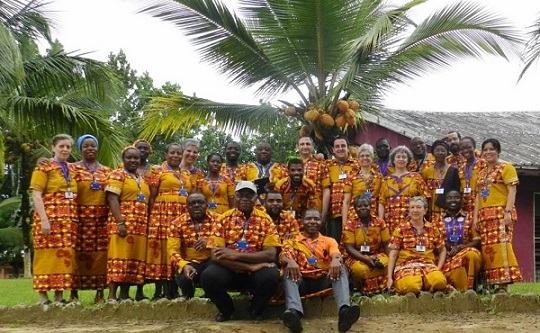- Contact us on - Contactez-nous sur - Contacte-nos em
- +233-30-277-8867/8
- +233-30-277-2548
- secam@secam.org
Collaborating North-to-South, Sisters Exemplify Changing World Demographics: Focus on Africa
Collaborating North-to-South, Sisters Exemplify Changing World Demographics: Focus on Africa
Global Sisters Report (GSR) || By The Life Panelists || 25 September 2017
 Openness to cultures. Psychological shifts. Economic differences. Succession planning. Forgiveness. This month our sister-panelists from all over the world speculate on the challenges and opportunities presented by the changing demographics of religious life, as the shift from global North to South becomes more evident. They addressed this question:
Openness to cultures. Psychological shifts. Economic differences. Succession planning. Forgiveness. This month our sister-panelists from all over the world speculate on the challenges and opportunities presented by the changing demographics of religious life, as the shift from global North to South becomes more evident. They addressed this question:
What challenges and opportunities do you see as leadership shifts from the global North to the global South?
Agnes Wamuyu Ngure is an Elizabethan Sister from Kenya. After ministries in education and work with refugees, she currently serves as executive secretary of the Association of Sisterhoods of Kenya (AOSK).
Leadership shifts from the global North to South should not take anyone by storm. But we need to prepare, invest for retirement, and (as I once advised a family) start “preparing their children to be orphans.”
Though this is hard talk, we must enable those we bring to life to survive on their own, take responsibility and grow. Succession planning must be a part of leadership, and transition requires deliberate North-to-South collaboration.
The shift from the global North to the global South is not just a geographical and cultural shift. It is also psychological. “Let go and letting be” requires growth in maturity.
There is an excellent article from Global Sisters Report about leadership shifts from the global North to South by Winnie Ojo. The title, “Charism is carrying our community through global changes,” says it all. We need to reflect on and internalize our charism, this great gift that we share.
The Franciscan Sisters of St. Ann, a congregation founded in the Netherlands, is a beautiful story of Dutch sisters who recruited African vocations: Now there are over 160 sisters in Africa and about 30 Dutch sisters in Holland. What a gift! With no new vocations in Holland for 50 years, they held the general chapter in Africa and elected their first African general superior. In 2015, the generalate was moved to Nairobi, Kenya — the first international congregation with a generalate there. Holland is now a province.
There was great excitement among the sisters in Africa at having their leadership closer and more readily available, but some would like to visit the original motherhouse and “see and touch something of what our founder touched and saw.” Most of us religious women have an emotional attachment to our original motherhouse. Moving the generalate out of the motherhouse is a great challenge; imagine how hard it is for the elderly sisters to let it go.
An article in Global Sisters Report about a discussion on the “diminishment in the wealthier global North and increases in the poorer global South” took me back to the early days of my congregation, the Franciscan Elizabethan Sisters. Mother Elizabeth Vendramini wrote in her diary about her struggles to provide even food and bedspreads for her sisters, but she and we know: God is always faithful to his promise.
Immmacula Chukwunyere is a member of the Congregation of the Handmaids of the Holy Child Jesus. She was a headmistress and teacher in Nigeria and Kenya before moving to the U.S. in 1999 and now teaches high school English.
The rising leadership of the South signifies the change from a capitalist economy (that benefited only the imperialists) to neoliberal capitalism that integrates the entire planet into a market-based economic system. Embedded within this “unprecedented” shift in power from North to South is the hope that this new economic system, powered by those who experienced poverty first hand, will be more attentive to global poverty and the devastating effects of irresponsible capitalism.
Consequently, a discussion of the South’s global leadership becomes not only a discussion of past mistakes, but also of the opportunities for creating a better world for all people. The term “global South” therefore becomes a metaphor for the call to participatory and collaborative leadership that prioritizes open dialogue among individuals in organizations and among nations in the global community, as we work for improved human conditions and a sustainable environment.
This shift brings with it the potential of enormous opportunities for equitable global development, but also poses major challenges and dangers that — if the South does not learn from the mistakes of the North, which has engulfed our world in constant violence and struggle for survival — the degradation of humanity and our environment will continue. //www.lse.ac.uk/researchAndExpertise/Experts/profile.aspx?KeyValue=a.mendez@lse.ac.uk” target=”_blank”>Alvaro Mendez, co-founder of London’s School of Economics said, “With material progress comes huge responsibility for effective human and social development.” The question becomes, how can the “South” maintain equitable material progress that prioritizes our global citizenship? Enmeshed in market-based capitalist economy, can the South — or all those who would benefit from global materialism — consciously avoid the exploitation of the poor and marginalized of our societies?
Evidence abounds that now “national economic development” no longer means the development of the entire nation, but only the development of groups and individuals (usually the rich and powerful) who can successfully participate in the global economy. Charged with the task of ridding the world of economic and political oligarchy, can the South effectively recalibrate and reset the materialistic tendencies that create and sustain regional and individual inequalities by putting people and our environment first?
The U.N. Development Program of 2013 called for the “emergence of global and regional frameworks that embody the principles of democracy, equity and sustainability.” This call encompasses all sectors of the human society, including religious organizations.
As the dwindling North turns to the South for the improvement and sustainability of humanity, the question remains, what are the southern churches, especially women religious congregations in Africa, doing to improve human life, social development and sustainability of our environment?
Read more… Global Sisters Report…

